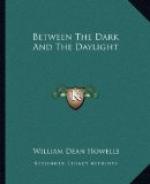It was not an insipid perfection of character which reported itself in these celestial terms, and Lanfear conjectured that angelic immortality, if such a thing were, could not imply perfection except at the cost of one-half of human character. When the girl wore a dress that she saw pleased him more than another, there was a responsive pleasure in her eyes, which he could have called vanity if he would; and she had at times a wilfulness which he could have accused of being obstinacy. She showed a certain jealousy of any experiences of his apart from her own, not because they included others, but because they excluded her. He was aware of an involuntary vigilance in her, which could not leave his motives any more than his actions unsearched. But in her conditioning she could not repent; she could only offer him at some other time the unconscious reparation of her obedience. The self-criticism which the child has not learned she had forgotten, but in her oblivion the wish to please existed as perfectly as in the ignorance of childhood.
This, so far as he could ever put into words, was the interior of the world where he dwelt apart with her. Its exterior continued very like that of other worlds where two young people have their being. Now and then a more transitory guest at the Grand Hotel Sardegna perhaps fancied it the iridescent orb which takes the color of the morning sky, and is destined, in the course of nature, to the danger of collapse in which planetary space abounds. Some rumor of this could not fail to reach Lanfear, but he ignored it as best he could in always speaking gravely of Miss Gerald as his patient, and authoritatively treating her as such. He convinced some of these witnesses against their senses; for the others, he felt that it mattered little what they thought, since, if it reached her, it could not pierce her isolation for more than the instant in which the impression from absent things remained to her.
A more positive embarrassment, of a kind Lanfear was not prepared for, beset him in an incident which would have been more touching if he had been less singly concerned for the girl. A pretty English boy, with the dawn of a peachy bloom on his young cheeks, and an impulsiveness commoner with English youth than our own, talked with Miss Gerald one evening and the next day sent her an armful of flowers with his card. He followed this attention with a call at her father’s apartment, and after Miss Gerald seemed to know him, and they had, as he told Lanfear, a delightful time together, she took up his card from the table where it was lying, and asked him if he could tell her who that gentleman was. The poor fellow’s inference was that she was making fun of him, and he came to Lanfear, as an obvious friend of the family, for an explanation. He reported the incident, with indignant tears standing in his eyes: “What did she mean by it? If she took my flowers, she must have known that—that—they—And to pretend to forget my name! Oh, I say, it’s too bad! She could have got rid of me without that. Girls have ways enough, you know.”




